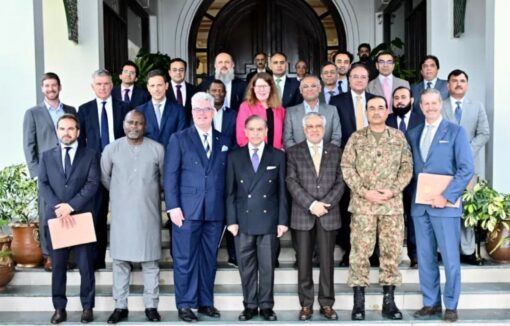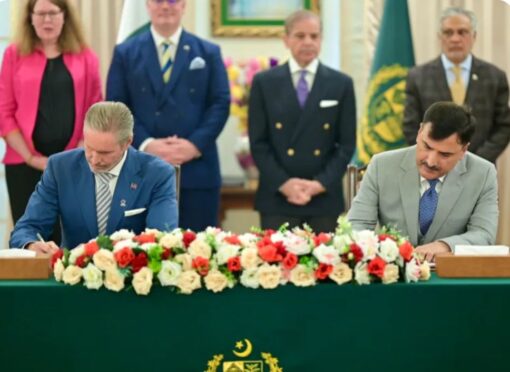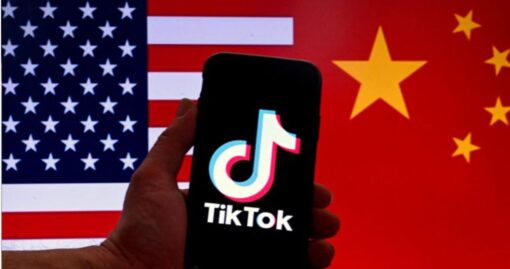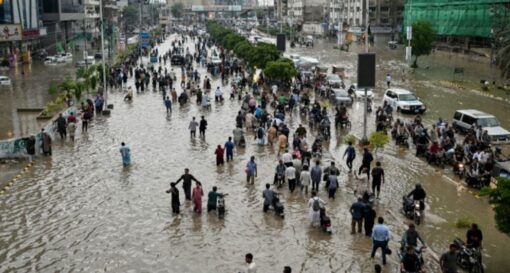Islamabad, Pakistan – When Pakistan’s Prime Minister Shehbaz Sharif meets U.S. President Donald Trump at the White House on Thursday, he will bring a promise unlike any previous Pakistani leader.
For decades, Pakistan’s primary strategic value to the United States was its role as a security partner, first during the Soviet occupation of Afghanistan and later in the so-called “war on terror.”
That relationship gradually eroded amid accusations that Islamabad had been duplicitous, a sentiment Trump himself echoed after U.S. forces discovered Osama bin Laden in Abbottabad.
A high-profile signing ceremony at the Pakistan Prime Minister’s residence earlier this month highlighted a new approach.
On September 8, two memorandums of understanding (MoUs) were signed in the presence of Sharif and Pakistan’s army chief, Field Marshal Asim Munir, along with senior officials from both Islamabad and Washington.
The main agreement focused on Pakistan supplying critical minerals and rare earth elements to the U.S., accompanied by a $500 million investment from an American company, United States Strategic Metals (USSM).
The MoUs follow Trump’s July pledge to collaborate with Pakistan on developing its oil reserves, reflecting a significant pivot in bilateral relations.
“This is a strategic handshake wrapped in economic opportunity, resource diplomacy and symbolic recalibration,” a former Pakistani three-star army general told Al Jazeera on condition of anonymity.

“This isn’t just about rocks in the ground. It is about who controls the future’s building blocks. For Pakistan, it’s a chance to claim its mineral narrative and tie it to national pride and legacy. For the U.S., it’s a strategic move on the global chessboard of resource politics.”
The minerals agreement is part of a broader initiative to enhance Pakistan’s economic role in U.S. strategic planning. At a Pakistani minerals summit in April, Sharif argued that harvesting the nation’s mineral reserves, valued in the trillions of dollars, could transform Pakistan’s struggling economy, burdened by $130 billion in external debt.
The key MoU was signed between the Frontier Works Organisation (FWO), a military-run engineering and construction entity, and USSM, a Missouri-based company specializing in recycling critical minerals from spent lithium-ion batteries and mining metals such as cobalt, nickel, and copper.
According to Sharif’s office, the partnership will begin the immediate export of “readily available minerals,” including antimony, copper, gold, tungsten, and rare earth elements.
The MoU also envisions establishing a specialized refinery in Pakistan to produce intermediate and finished products for U.S. markets.
“The first phase of this deal is envisaged at approximately $500 million of investments into Pakistan’s critical minerals sector,” the prime minister’s office stated, adding that subsequent steps would explore the wider resource base.
Analysts noted that the MoU is not a binding mining license but an early-stage instrument signaling intent. Zain Kazmi, chief operating officer of Islamabad-based Capital Strategies Group, said, “From USSM’s side, an MoU gives goodwill at early stage in potential projects. Whatever deposits show the most potential quickest can come online quickly.”
A senior government geologist, speaking on condition of anonymity, emphasized that the focus is on “strategic minerals and rare earth elements” and pointed to deposits of copper and antimony already under FWO exploration.
“FWO is already operating mines in Waziristan region in Khyber Pakhtunkhwa province. They also have exploration licenses in Chaghi Belt in Balochistan, as well as in Gilgit-Baltistan,” the official said, noting that mineral projects are typically long-term, lasting five to 15 years.
“The plan is to first export antimony, copper, and other readily available products, followed by installing processing plants, and lastly, exploration in various areas.”
Rare earth minerals, a group of 17 metallic elements used in electronics, semiconductors, and defense systems, are dispersed in the Earth’s crust and difficult to extract.
The U.S. Geological Survey (USGS) maintains a list of 54 “critical minerals” essential for clean energy and high-tech manufacturing, including copper and silver.
Although Pakistan was not previously recognized among the countries with mapped rare earth deposits, experts like Moin Raza Khan, former managing director of state-owned Pakistan Petroleum Limited, estimate that roughly a quarter of Pakistan’s landmass could host critical minerals.
Much of the potential lies in Balochistan, Khyber Pakhtunkhwa, and Gilgit-Baltistan, regions with harsh terrain or security challenges.
Balochistan, home to approximately 15 million people, is Pakistan’s poorest province despite enormous natural-resource wealth. Khyber Pakhtunkhwa has experienced surges in violence, and tribal areas such as South and North Waziristan are believed to hold vast mineral reserves.
The most economically significant deposits include copper at Saindak and Reko Diq. Saindak, near the Iran border, began commercial mining in the early 2000s under China’s Metallurgical Construction Corporation, contributing $842 million in exports in 2024.
Reko Diq, managed by Canada’s Barrick Mining alongside federal and provincial stakeholders, is considered one of the world’s largest underdeveloped copper-gold deposits, containing an estimated 15 million tonnes of copper and 26 million ounces of gold, valued at more than $190 billion.
While the MoU is being hailed as a breakthrough, critics caution that Pakistan has a history of unverified claims regarding its mineral and oil reserves. Past announcements of “oil and gas jackpots” have failed to yield commercially viable results.
Analysts like Khan question whether USSM has the capacity to execute exploration and mining operations at the required scale. “It appears that at least for now, all they are looking for is to export the concentrate, and act like a trading company rather than a mining company,” Khan said.
Still, Kazmi noted that the MoU could attract larger investors, stating, “It marks the arrival of high-quality interest in the mining sector in the country and opens the door for other top-tier mineral processors and mining investors to enter the Pakistani market.”
The agreement also raises geopolitical questions. Pakistan has deepened economic ties with China through the $62 billion China-Pakistan Economic Corridor, particularly in Balochistan, where Chinese investments have provoked local resentment.
U.S. investment in the same regions could complicate security concerns but may also complement Chinese interests by boosting the local economy and curbing insurgent activity. Uzair Younus, principal at The Asia Group, said, “any attackers would need to risk the ire of not just Pakistan and China, but the U.S., too. If the local economy gains from U.S. investments, that, too, would benefit China.”
Islamabad-based security analyst Amir Rana noted, “While China might have been hoping they could have had the monopoly on Pakistan’s minerals, I do not foresee the relationship being harmed in any major way.” Kazmi added, “no country has been given carte blanche on Pakistani resources besides Pakistan itself, which holds an inalienable right to those deposits.”

Experts emphasize that turning Pakistan’s mineral wealth into tangible economic benefits will require more than foreign capital.
The retired army general told newsmwn, “Achieving success in this sector demands a shift from militarized control to inclusive development, where local communities are empowered as stewards of their land, royalties are transparently shared, and infrastructure serves both extraction and dignity.”
He added, “Only by reframing mineral wealth as a national legacy, rather than a contested commodity, can Pakistan turn its buried potential into a foundation for unity, sovereignty and regional influence.”
Pakistan’s pursuit of critical minerals represents a significant pivot in its relations with the U.S., moving from a primarily security-oriented partnership toward economic and resource diplomacy. While the agreement is still at an early stage, with implementation challenges and verification required, the symbolic and strategic weight of the MoU is already evident.
By positioning itself as a potential supplier of minerals essential for U.S. industry, defense, and technology, Pakistan hopes to redefine its role on the global stage, attract high-quality investment, and strengthen its long-term economic prospects, all while navigating the complex balance of regional alliances and geopolitical interests.
The coming months will be crucial in determining whether Pakistan can convert these diplomatic overtures into measurable economic outcomes.
With the U.S. expressing renewed interest in the country’s mineral wealth and the Trump administration keen on securing strategic supplies, Pakistan’s government faces the dual challenge of meeting investor expectations and ensuring that local communities benefit from resource development.
The stakes are high, but so too is the potential for Pakistan to emerge as a key player in global mineral markets while strengthening its bilateral ties with the United States.


